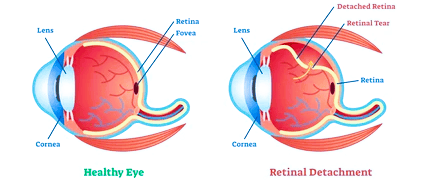Retinal Disorders: Causes, Symptoms, Treatment
Explore the causes, symptoms, and treatments for retinal disorders. Learn how to manage and prevent issues affecting your vision effectively. #retinal disorder


Retinal disorders refer to a group of conditions that affect the retina, the thin layer of tissue at the back of the eye responsible for converting light into electrical signals that are sent to the brain. These disorders can cause vision loss or impairment and may have various causes. In this article, we will explore the causes, symptoms, treatment options, and precautions related to retinal disorders.
Causes of Retinal Disorders
Retinal disorders can have multiple causes, including:
Age-related macular degeneration (AMD): This is one of the leading causes of vision loss in individuals over the age of 50. It occurs when the macula, the central part of the retina, deteriorates over time.
Diabetic retinopathy: People with diabetes are at risk of developing this condition, which is caused by damage to the blood vessels in the retina.
Retinal detachment: This occurs when the retina separates from the underlying tissue, often due to trauma, injury, or other underlying eye conditions.
Retinitis pigmentosa: This is a genetic disorder that causes the breakdown and loss of cells in the retina, leading to vision loss.
Macular edema: Fluid accumulation in the macula can cause swelling and distortion of central vision.
Symptoms of Retinal Disorders
The symptoms of retinal disorders can vary depending on the specific condition. Some common symptoms include:
Blurred or distorted vision
Loss of peripheral vision
Floaters or flashes of light
Difficulty seeing in low light conditions
Loss of central vision
Reduced color perception
Treatment Options for Retinal Disorders
Treatment for retinal disorders depends on the specific condition and its severity. Some common treatment options include:
Medications: Certain medications, such as anti-VEGF drugs, may be used to manage retinal disorders like AMD or diabetic retinopathy.
Laser therapy: Laser treatment can be used to seal leaking blood vessels or repair retinal tears.
Surgery: In cases of retinal detachment or advanced stages of certain disorders, surgery may be necessary to reattach the retina or implant a prosthetic device.
Gene therapy: Research is ongoing to develop gene therapies that can potentially treat genetic retinal disorders.
Precautions for Retinal Disorders
If you have a retinal disorder or are at risk of developing one, it is important to take certain precautions to protect your vision:
Regular eye exams: Schedule regular eye exams with an ophthalmologist to monitor your eye health and detect any changes or early signs of retinal disorders.
Manage underlying health conditions: If you have diabetes or other systemic conditions, work with your healthcare provider to manage them effectively and reduce the risk of complications.
Protect your eyes: Wear protective eyewear when participating in activities that could potentially cause eye injuries.
Quit smoking: Smoking has been linked to an increased risk of developing retinal disorders, so quitting smoking can help protect your vision.
Follow a healthy lifestyle: Maintain a balanced diet, exercise regularly, and maintain a healthy weight to support overall eye health.
In conclusion, retinal disorders can have various causes and can significantly impact vision. It is crucial to be aware of the symptoms, seek appropriate medical care, and take necessary precautions to protect your eye health. Regular eye exams and early intervention can play a vital role in managing retinal disorders and preserving vision.
